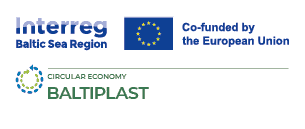
“Small actions pay off” The BALTIPLAST Guidebook
14 July 2025
Plastic Waste: From Environmental Issue to Strategic Business Priority
In 2022, Europe generated over 32 million tonnes of plastic waste, yet only about one-third was recycled. The rest was either incinerated, sent to landfills, or leaked into the environment, contributing not only to pollution but also to the irreversible loss of valuable resources.
What was once seen primarily as an environmental concern has now evolved into a pressing business challenge. Companies are increasingly held accountable for their plastic use, not only by governments and regulators, but also by consumers, investors, and other market actors demanding sustainable practices.
The European Union is taking decisive steps to curb plastic pollution and push for a circular economy. Key regulations such as the Single-Use Plastics Directive and the Corporate Sustainability Reporting Directive (CSRD) are setting new benchmarks for business transparency and responsibility in plastic consumption.
At the same time, plastic waste is gaining prominence in Environmental, Social, and Governance (ESG) reporting frameworks. This shift affects not just legal compliance, but also investor confidence, customer trust, and supply chain stability, making it critical for businesses to proactively manage their plastic footprint.
Turning Challenges into Opportunities
Beyond legal compliance and environmental impact, reducing plastic consumption also presents tangible strategic and financial benefits. Lowering dependency on single-use plastics (SUPs) can improve operational efficiency, reduce procurement costs, and enhance brand reputation in a sustainability-driven market.
To support this transition, the BALTIPLAST Guidebook provides a practical toolkit for businesses across the Baltic Sea Region: from small retailers to large corporations. It presents a series of soft measures (low-effort, low-investment) and technical solutions to help companies cut plastic use and packaging, while minimizing waste across their operations.
Guided by the principle that “small actions pay off”, the guidebook compiles real-life case studies, lessons learned, and best practices from the BALTIPLAST project. It fills important gaps in knowledge-sharing and aims to empower businesses to make informed, impactful decisions in their plastic reduction journey.
As a companion to the guidebook, a short video is also available, showcasing success stories and practical insights from the region: Link to the video
Together, these resources help companies not only align with circular economy principles, but also actively contribute to a cleaner and more resource-efficient Baltic Sea Region.
From Rules to Roadmaps: Turning Regulations into Business Strategy
Plastic regulations are no longer just legal hurdles—they’re strategic opportunities. The BALTIPLAST Guidebook helps businesses understand how EU directives like the Single-Use Plastics Directive (SUP), Packaging and Packaging Waste Regulation (PPWR), and Eco-Design for Sustainable Products Regulation (ESPR) can drive smarter, more sustainable operations.
By aligning early with these policies, companies can reduce risks, cut costs, and position themselves as leaders in sustainability. It’s not just about compliance—it’s about gaining a competitive edge, improving brand reputation, and unlocking new market opportunities. For details, see the section “Existing Plastic Regulations in Europe” in the guidebook.
Beyond the Bottom Line: Why Reducing Plastics is Smart Business
The guidebook also makes a clear business case for cutting down single-use plastics (SUPs). Based on real-life pilots and global best practices, it outlines five strong reasons to act:
1.- Cut Costs, Not Corners: Replacing disposables with reusables lowers procurement, waste, and shipping costs.
2.- Win the Market with a Competitive Edge: Customers and clients expect sustainability. Leading on SUP reduction boosts visibility and market appeal.
3.- Build a Reputation People Trust: Demonstrating environmental commitment strengthens your reputation with customers, staff, and investors.
4.- Meet the Customers You Want to Keep: Plastic-free products connect with today’s conscious consumers and drive brand loyalty.
5.- Make Your Supply Chain Stronger: Reducing dependence on volatile plastic materials builds resilience and reduces regulatory risks.
Real Stories, Real Impact: How Businesses Are Cutting Plastic
Across the Baltic Sea Region, companies are already seeing results from simple changes:
- Switching to refillable bottles and reusable food containers
- Returning packaging to suppliers
- Cutting unnecessary plastic film and buying in bulk
Kaunas, Lithuania: Office plastic waste dropped by 53% with basic swaps.
Valmiera, Latvia: Hotels and events reduced plastic through audits and easy substitutions.
Explore these and more in the Best Practices and Success Stories section of the BALTIPLAST Guidebook.





